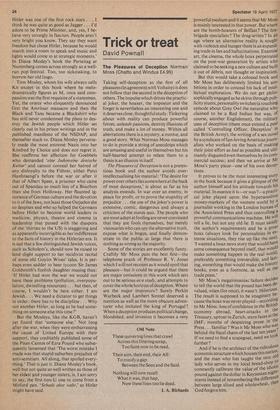Trick or treat
David Pownali
The Pleasures of Deception Norman Moss (Chet° and Windus £4.95)
Taking self-deception as the first of all pleasures (in agreement with Voltaire) it does not follow that the second is the deception of others. The impulse which drives the practical joker, the hoaxer, the impostor and the forger is nevertheless an interesting one and it deserves close, thoughtful study. Tinkering about with reality can produce powerful forces, unleash passions, destroy illusions of truth, and make a lot of money. Within all aberrations there is a mystery, a motive, and a good story. What Norman Moss manages to do is provide a string of anecdotes which are amusing and useful in themselves but his half-hearted attempt to relate them to a thesis is an illusion in itself.
The Pleasures of Deception is not a pretentious book and the author avoids overintellectualising his material : 'The desire for power over others lies somewhere at the back of most deceptions,' is about as far as his analysis extends. In war over an enemy, in peace for profit, or to prove the stupidity of prejudice. . . the use of the joker's power is extensive, comic, dangerous and always a criticism of the status quo. The people who are most adept at fooling are never convinced that they are fools themselves, but merely visionaries who can spy the alternative truth, expose what is bogus, and finally demonstrate to the public at large that there is nothing as wrong as the majority.
Some of the stories are excellently funny. Craftily Mr Moss puts the best first—the telephone prank of Professor R. V. Jones which f will not recount as it would spoil that pleasure—but it could be argued that there are major omissions in this work which sets out to be serious as a study, and attempts to cover the whole horizon of deception. Where are the major impostors? Surely Perkin Warbeck and Lambert Simnel deserved a mention as well as the more obscure adventurer who imitated the king of Portugal? When a deception produces political change, bloodshed, and invasion it becomes a very powerful medium and it seems that Mr Moss is mainly interested in that power. But where are the bomb-hoaxers of Belfast ? The firebrigade specialists? The drag-artists? In an age where an alternative reality is sought with violence and hunger there is an expanding trade in lies and hallucinations. Examine art, the cinema, the whole hoax perpetrated on the post-war generation by artists who claimed to be seeking a new culture and built it out of debris, not thought or inspiration.
But this would take a colossal book and Mr Moss has deliberately limited his ambitions in order to conceal his lack of intellectual exploration. We do not get philosophically engaged as he skims through publicity stunts, personality switches (a touching episode about Grey Owl the naturalist who claimed to be a Red Indian but was, of course, another Englishman), the military uses of deception (there once existed a post called 'Controlling Officer, Deception' hl the British Army), the writing of a sex novel by a syndicate of fun-loving American jour11alists who worked on the basis of making their joint effort as bad as possible and ultimately disgusted even themselves by its commercial success; and then we arrive at Mr Moss's party piece—one of his own deceptions, It proves to be the most interesting story in the book because it gives a glimpse of the author himself and his attitude towards his material. In essence it is—or was ?—a practical joke playedupon the hypersensitive money-markets of the western world by a journalist working in the London bureau of the Associated Press and thus controlling a powerful communications machine. He will tell a lie, but not any old lie. It must satisfY the author's requirements and be a great hoax (always look for personalities in extreme situations, they rise up like the surl)' wanted a hoax news story that would have some consequence beyond itself, that would make something happen in the real world, preferably something irreversible, and lasting, something that would make the historY books, even as a footnote, as well as the trade press.'
Mr Moss's megalomaniac failure decides to tell the world that the pound has been devalued, when (for once), it wasn't.
Hilarious.
The result is supposed to be innaginarY because the hoax was never played—according to Mr Moss : loss of confidence in the British economy abroad, heart-attacks in the Treasury, uproar in Zurich, stern faces at the IMF, months of despairing prose in the Press ... familiar? Was it Mr Moss who was, behind the fiscal chaos of the last ten Years,: If we need to find a scapegoat, need we 100' further? And if he is the architect of the ridiculous economic structure which houses this nati0n7 and the man who has taught the nice old lady who serves in my local bread-shoO t.° constantly calibrate the value of the idiotite. pound against the dollar in Keynesian niglice mares instead of remembering the differen 0 between large sliced and wholewheat, the God forgive him.






































 Previous page
Previous page